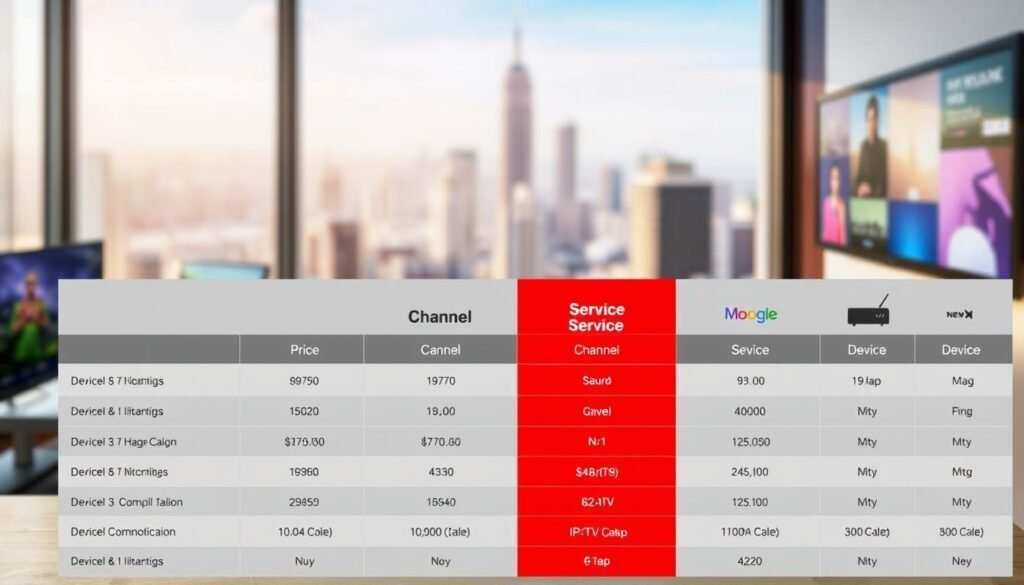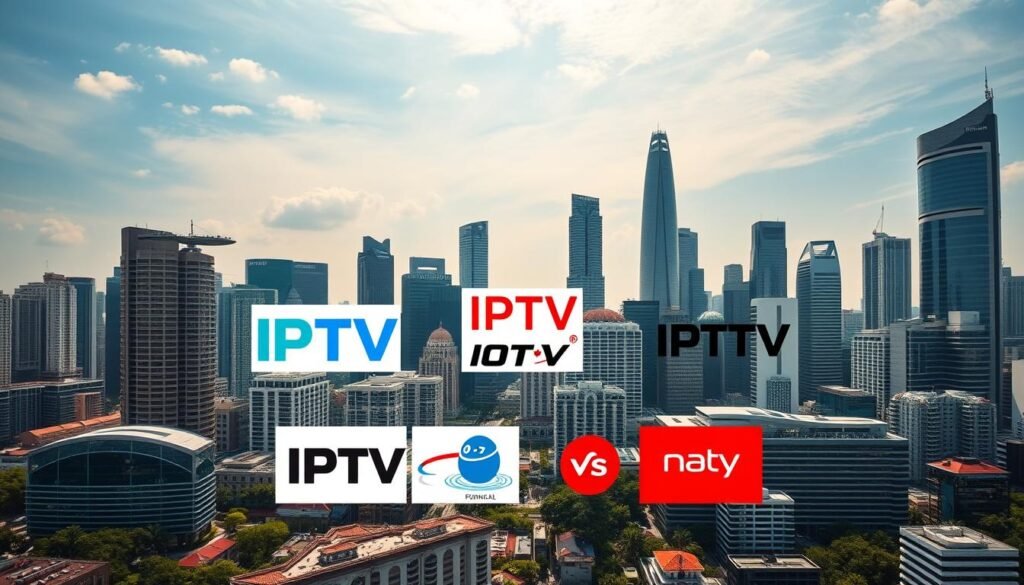As I explore the world of television streaming, I find that IPTV services are revolutionizing the way we consume television content.
IPTV, or Internet Protocol Television, allows users to stream television content over the internet, providing a more flexible and personalized viewing experience.
With an IPTV subscription, viewers can access a wide range of channels and on-demand content, making it an attractive alternative to traditional TV.
As the demand for online streaming continues to grow, understanding what IPTV is and how it works is becoming increasingly important.
Key Takeaways
- IPTV allows for flexible and personalized TV viewing.
- IPTV services provide access to a wide range of channels and on-demand content.
- An IPTV subscription is an alternative to traditional TV.
- IPTV is revolutionizing the way we consume television content.
- Understanding IPTV is becoming increasingly important.
Understanding What is IPTV
As I delve into the world of IPTV, it’s essential to understand its fundamental concept and how it revolutionizes television viewing. IPTV, or Internet Protocol Television, is a technology that allows users to stream television content over the internet. This method of content delivery offers a range of benefits and differences compared to traditional television and cable services.
The Definition and Core Concept of IPTV
IPTV is defined by its use of internet protocols to deliver television programming. This core concept allows for a more personalized and flexible viewing experience. Unlike traditional broadcast methods, IPTV enables users to access content on-demand, pausing, rewinding, or fast-forwarding through programs as they see fit. The benefits of IPTV include its ability to offer a wide range of channels and content options, all accessible through a stable internet connection.
How IPTV Differs from Traditional Television and Cable
One of the key differences between IPTV and traditional television or cable is the method of content delivery. While traditional services rely on broadcast signals or cable infrastructure, IPTV streams content directly over the internet. This difference allows IPTV to offer more flexible viewing options, including the ability to watch on multiple devices and access to on-demand content. Furthermore, IPTV services often provide more customizable packages, allowing users to select the channels and content they are truly interested in, potentially saving money and enhancing the viewing experience.
The Technical Workings of IPTV
The mechanics of IPTV involve a combination of streaming protocols and data transmission processes that are crucial for its operation. To understand how IPTV works, it’s essential to delve into its technical aspects.
How Does IPTV Work? The Basic Technology
IPTV delivers television content over the internet using streaming protocols. These protocols enable the efficient transmission of data, ensuring that users can enjoy a seamless viewing experience.
Best service i try Zenixtv.com
Support : zenixtv
Streaming Protocols Explained
Streaming protocols such as HTTP Live Streaming (HLS) and Dynamic Adaptive Streaming over HTTP (DASH) play a crucial role in IPTV. They allow for adaptive bitrate streaming, which adjusts the video quality based on the user’s internet connection.
Data Transmission Process
The data transmission process in IPTV involves breaking down video content into small packets of data, transmitting these packets over the internet, and reassembling them at the user’s device. This process is facilitated by content delivery networks (CDNs) that cache content at multiple locations, reducing latency and improving streaming quality.
The Infrastructure Behind IPTV Services
The infrastructure supporting IPTV services includes a robust network of servers, data centers, and CDNs. This infrastructure is critical for handling the demands of streaming high-quality video content to a large number of users.
| Infrastructure Component | Function |
|---|---|
| Servers | Manage and distribute IPTV content |
| Data Centers | Store and process IPTV data |
| CDNs | Cache content to reduce latency and improve streaming quality |
Types of IPTV Services Available
IPTV services have revolutionized the way we consume television, offering a range of options to suit different viewing preferences. As an IPTV subscriber, I can choose from various services that cater to my entertainment needs.
Live IPTV Broadcasting
Live IPTV broadcasting allows me to watch my favorite TV channels in real-time, just like traditional television. This service is particularly useful for events like sports, news, and live concerts.
Video on Demand (VOD) Services
With Video on Demand services, I have access to a vast library of content that I can watch at my convenience. This includes movies, TV shows, and documentaries.
Time-Shifted Media and Catch-Up TV
Time-shifted media and catch-up TV services enable me to watch content that I missed at its original broadcast time. This is particularly useful for catching up on my favorite TV shows.
| Service Type | Description | Benefits |
|---|---|---|
| Live IPTV Broadcasting | Real-time TV channel streaming | Ideal for live events and news |
| Video on Demand (VOD) | Access to a library of on-demand content | Watch content at your convenience |
| Time-Shifted Media and Catch-Up TV | Watch missed content at a later time | Catch up on favorite shows and events |
By understanding the different types of IPTV services available, I can make informed decisions about my IPTV subscription and choose the services that best suit my viewing habits.
Essential Equipment for IPTV Setup
The right equipment is crucial for a seamless IPTV viewing experience. To get the most out of your IPTV services, you’ll need to ensure you have the appropriate hardware and a stable network connection.
IPTV Boxes and Streaming Devices
IPTV boxes and streaming devices are essential for decoding IPTV streams and displaying them on your TV. These devices come in various forms, offering different features and capabilities.
Android TV Boxes
Android TV boxes are popular choices for IPTV streaming due to their versatility and wide app support. They offer a user-friendly interface and can handle various media formats.
Smart TVs with IPTV Capabilities
Some Smart TVs come with built-in IPTV capabilities, allowing you to access IPTV services directly without the need for an external device. These TVs often have dedicated IPTV apps.
Network Requirements for Optimal IPTV Streaming
A stable and fast internet connection is vital for uninterrupted IPTV streaming. Your network setup plays a critical role in the quality of your IPTV experience.
Internet Speed Recommendations
For optimal IPTV streaming, a minimum internet speed of 10 Mbps is recommended for HD content. However, higher speeds may be required for 4K or multiple simultaneous streams.
Router Considerations
Your router should support the latest Wi-Fi standards and have sufficient bandwidth to handle IPTV streaming along with other internet activities.
| Device | Key Features | Recommended For |
|---|---|---|
| Android TV Box | Versatile, wide app support, user-friendly interface | IPTV streaming, gaming, media playback |
| Smart TV | Built-in IPTV capabilities, dedicated IPTV apps | Direct IPTV access, streamlined viewing experience |
Setting Up Your IPTV Service: Step-by-Step Guide
The process of setting up IPTV involves several key steps that are crucial for a seamless viewing experience. To get started, you need to understand the basics of how IPTV works and what you need to do to set it up correctly.
Choosing the Right IPTV Subscription
Selecting the right IPTV subscription is the first step towards enjoying your favorite TV shows and movies. When choosing an IPTV provider, consider factors such as the variety of channels, video quality, and customer support. Look for providers that offer a free trial or a money-back guarantee to test their service before committing to a long-term subscription.
Installing and Configuring Your IPTV System
Once you’ve chosen your IPTV subscription, the next step is to install and configure your IPTV system. This involves setting up your IPTV device or app on your preferred device.
Setting Up on Android Devices
For Android devices, you can usually download the IPTV app from the Google Play Store. Simply search for your IPTV provider’s app, download it, and follow the in-app instructions to configure your IPTV service.
Setting Up on iOS Devices
For iOS devices, you can find IPTV apps in the Apple App Store. Download the app, and then enter your subscription details to start streaming.
Connecting Multiple Devices to One Subscription
Many IPTV providers allow you to connect multiple devices to a single subscription. Check with your provider to see if this is an option and how to set it up. This feature is particularly useful for households with multiple viewers.
By following these steps, you can enjoy a comprehensive IPTV experience across various devices, enhancing your viewing flexibility and convenience.
Comparing IPTV Subscription Options
When it comes to IPTV subscriptions, understanding the various options available is crucial for making an informed decision. IPTV services offer a range of plans designed to cater to different viewing habits and preferences.
Monthly vs. Annual Subscription Plans
One key consideration is whether to opt for a monthly or annual subscription plan. Monthly plans offer flexibility, allowing users to change or cancel their subscription at short notice. Annual plans, on the other hand, often come with discounts, providing cost savings for committed viewers. For instance, some IPTV services may offer a 10% discount on annual plans, making them a more economical choice for long-term users.
Single-Device vs. Multi-Device Packages
Another important factor is the number of devices to be connected. Single-device packages are suitable for individuals who primarily watch IPTV on one device, such as a smart TV or a specific streaming device. Multi-device packages, however, allow for simultaneous streaming on multiple devices, making them ideal for households with multiple viewers or for those who want to watch IPTV on different devices. Some IPTV services offer up to 5 simultaneous streams on their premium multi-device packages.
Channel Selection and Content Libraries
The variety of channels and content libraries is also a critical aspect of IPTV subscription options. Different services offer varying channel lineups, including sports, entertainment, news, and more. Some IPTV services provide extensive content libraries with on-demand movies and TV shows, enhancing the overall viewing experience. When comparing IPTV services, it’s essential to consider the iptv channels and content offerings that align with your viewing preferences.
| IPTV Service Features | Basic Plan | Premium Plan |
|---|---|---|
| Number of Devices | 1 | Up to 5 |
| Channel Lineup | 100+ channels | 500+ channels |
| Content Library | Limited VOD | Extensive VOD library |
| Subscription Duration | Monthly | Monthly/Annual |

By carefully evaluating these factors, including the benefits of iptv and the specific features of different IPTV services, users can select a subscription that best meets their needs and enhances their viewing experience.
The Benefits of IPTV Over Traditional Cable
In my experience, IPTV provides a more flexible and cost-effective alternative to traditional cable services. As I delve into the specifics, it becomes clear that IPTV offers several advantages that make it an attractive option for modern viewers.
Cost Advantages of IPTV Services
One of the primary benefits of IPTV is its cost-effectiveness. Unlike traditional cable, IPTV services often come with lower monthly subscription fees and fewer additional charges. This is because IPTV operates over the internet, reducing the need for extensive infrastructure investments. As a result, providers can pass the savings on to consumers, making IPTV streaming a more economical choice.
Content Flexibility and Customization Options
IPTV also excels in terms of content flexibility and customization. With IPTV, users can access a wide range of channels and on-demand content, tailored to their viewing preferences. This level of personalization is typically not available with traditional cable services. Furthermore, the best IPTV services often include features like pause, rewind, and record live TV, enhancing the overall viewing experience.
By switching to IPTV, viewers can enjoy a more personalized and cost-effective television experience. As the demand for flexible and affordable entertainment options continues to grow, IPTV is well-positioned to meet these needs, offering a compelling alternative to traditional cable.
Popular IPTV Providers in Singapore
When it comes to IPTV services in Singapore, several local and international providers stand out. The city-state’s IPTV market is characterized by a mix of local telecom companies and global streaming services.
Local Singapore IPTV Services
Local IPTV services in Singapore are primarily offered by telecom companies that have expanded their services to include television streaming.
StarHub IPTV
StarHub offers a comprehensive IPTV service with a wide range of channels and on-demand content. Their service is known for its reliability and high-quality streaming.
Key Features:
- Extensive channel lineup
- High-definition streaming
- On-demand content library
Singtel IPTV
Singtel’s IPTV service, known as mio TV, provides a robust offering with a variety of channels and interactive features. It’s a popular choice among Singaporeans.
“Singtel’s mio TV has revolutionized the way we consume television in Singapore, offering a personalized viewing experience.” – A satisfied customer.
International IPTV Options Available in Singapore
Besides local services, several international IPTV providers operate in Singapore, offering a diverse range of content and services.

These international services often provide niche content not available through local providers, catering to the diverse tastes of Singapore’s multicultural population.
Legal Considerations for IPTV Users
As IPTV continues to gain popularity in Singapore, understanding its legal implications becomes increasingly important. IPTV users must be aware of the legal framework surrounding these services to avoid potential issues.
Understanding IPTV Legality in Singapore
In Singapore, the regulation of IPTV services falls under the purview of the Info-communications Media Development Authority (IMDA). IPTV providers must comply with IMDA’s guidelines to operate legally. Users should verify that their IPTV service is licensed and compliant with local regulations. According to the IMDA, “any entity providing pay TV services, including IPTV, must be registered with the IMDA.” This ensures that the IPTV service is legitimate and adheres to Singapore’s broadcasting standards.
Copyright Issues and Choosing Legitimate Services
One of the major legal concerns with IPTV is copyright infringement. Users should be cautious of IPTV providers that offer an extensive range of channels without proper licensing agreements. Legitimate IPTV services will have agreements in place with content providers, ensuring that they are authorized to broadcast the content. As noted by a legal expert, “using unauthorized IPTV services can lead to legal consequences for users, including fines.” To avoid such issues, it’s crucial to choose an IPTV provider that is transparent about its licensing and complies with copyright laws.
When selecting an IPTV service, users should look for providers that offer a clear subscription model, have a professional website, and provide customer support. A legitimate IPTV provider will also ensure a stable and secure service, protecting users from potential legal and technical issues.
Troubleshooting Common IPTV Problems
To enjoy uninterrupted IPTV streaming, it’s essential to address common issues that may arise. IPTV services, like any other digital platform, can be affected by various technical problems. Understanding how to troubleshoot these issues can significantly enhance your viewing experience.
Buffering and Streaming Quality Issues
Buffering and poor streaming quality are often related to internet connectivity. Ensure your internet speed meets the IPTV provider’s minimum requirements. You can also try restarting your router or upgrading your internet plan if you consistently experience buffering.
Connection and Authentication Problems
Connection issues can stem from incorrect login credentials or server overload. Double-check your username and password, and ensure your subscription is active. If problems persist, contact your IPTV service provider for assistance.
Audio and Video Synchronization Concerns
Audio and video sync issues can be frustrating. Try restarting your IPTV device or application to resolve this problem. If the issue continues, check for firmware updates or contact your service provider for further guidance.
Conclusion: Is IPTV Right for You?
As we explore the world of IPTV, it’s clear that this technology offers a flexible and modern way to consume television content. Understanding what IPTV is and how it works is the first step in deciding if it’s the right choice for your viewing needs.
With various IPTV subscription options available, including live broadcasting, video on demand, and time-shifted media, there’s a service to suit different preferences. Choosing the best IPTV service depends on your specific requirements, such as channel selection, content libraries, and device compatibility.
For viewers in Singapore, IPTV presents an attractive alternative to traditional cable TV, offering cost advantages and customization options. When selecting an IPTV provider, it’s essential to consider factors like network requirements, equipment needs, and legal compliance to ensure a seamless viewing experience.
By weighing the benefits and considerations of IPTV, you can make an informed decision about whether this technology is right for you. As the demand for online streaming continues to grow, IPTV is poised to become an increasingly popular choice for entertainment and information.
